Name of the course
Yoga Alliance certified 200 Hours Hatha Yoga Teacher Training Course.
Syllabus
The syllabus is made to fulfil the objectives containing philosophical and practical aspects of yoga with emphasis on the allied sciences. Syllabus of the Yoga Teacher Training Course consists of the following.
1. Techniques, Training and Practice
The daily practical training of teacher training program involves the study and practice of the following yogic techniques or practices with their brief theoretical knowledge about the importance of the name, the technique, salient points, precautions to be taken and advantages of each of the following yogic practices including the techniques of alignment and assistance.
Shatkarmas (Cleansing Techniques)
Asanas/Postures (Selected Asanas in Hatha Yoga)
Pranayamas/breathing techniques
Bandhas (Energy Locks)
Mudras/Gestures
Meditative Relaxation e.g Yoga Nidra
Meditation.& Mantra Chanting
2. Teaching Methodology
In this module, students will learn and experience the teaching skills of presentation & practice of teaching in yoga.
Communication skills in yoga teaching practice such as group dynamics, time management, and the establishment of priorities and boundaries.
Teachings skills to address the specific needs of individuals and special populations in group set up to the possible extent.
Preparation of lesson plan
Selection & sequencing of yoga practices
Demonstration of types of teaching methods
Practical training on class management
Principles of demonstration, observation, assisting and correcting
Qualities of a teacher
The student learning process
Business aspects of teaching yoga
3. Anatomy and Physiology
Students will learn about the structure, parts/process and functions of muscular and skeletal system
respiratory & cardio-vascular system as well as digestive and excretory system.
Health and Yoga: Definition, meaning, concept of health in yoga, importance and role of yoga and yogic diet and nutrition in maintaining holistic health.
Students will also learn role of yoga in maintaining holistic health through the understanding curative preventive and promotive aspects of yoga as natural health care measures through the applied anatomy and physiology with applied yoga.
4. Yoga philosophy, lifestyle and ethics for yoga teachers
Philosophical perspectives of yoga
Yoga, its meaning, definitions, aims and objectives
Historical development of yoga
Classical schools of yoga and their concepts and significance of the schools such as raja yoga, hatha yoga, karma yoga, bhakti yoga
The Ashtanga yoga system of Patanjali
The art of yoga ethical preparation
Curriculum of classical hatha yoga and its scope and significance of yoga in modern life
Philosophy of Bhagavad-Gita
Importance of Bhagavad-Gita and its universal significance and essence of its teachings to the modern life
Philosophy of ayurveda and concept of health
Introduction to Ayurveda and definition of health according to Ayurveda
Concepts of health in Ayurveda and its significance for positive health
5. Practicum
Includes practice teaching, receiving feedback, observing others teaching and hearing and giving feedback. Also includes assisting students while someone else is teaching.
Presentations and group discussions.



